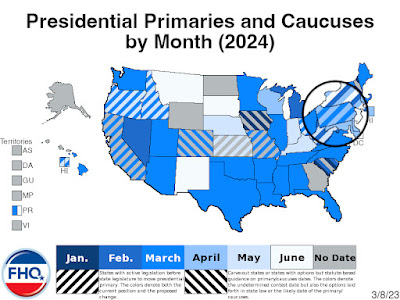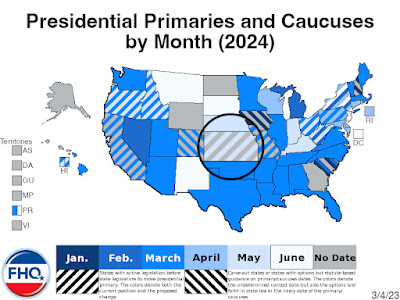Thoughts on the invisible primary and links to the goings on of the moment as 2024 approaches...
My former UGA colleagues, Charles Bullock and Loch Johnson, have an interesting take on the presidential nomination process up over at The Bulwark. Runoffs in Georgia are out of vogue these days after two consecutive electoral cycles with high profile Senate overtime elections, but that has not stopped Bullock and Johnson from suggesting that adding runoff elections to the presidential nomination process might help to provide some guardrails against novice and/or extremist candidates. Maybe.
But the whole concept is premised on the idea that the Republican presidential nomination process is winner-take-all; that a candidate can win a mere plurality by just one vote and still win all of the delegates from a state. It is not. There were 19 truly winner-take-all contests in the 2020 Republican presidential nomination process, meaning that 37 other primaries, caucuses and conventions had some other form of delegate allocation rules. And sure, Bullock and Johnson discussed all of this in the context of Trump's 2016 victory, not 2020. But there were ten fewer truly winner-take-all contests then.
Look, there may be something to requiring a candidate to win a majority in a primary or caucus in order to win delegates (not to mention broaden a candidate's appeal). But a separate runoff is not necessary in order to accomplish that. In fact, there are already rules on the Republican National Committee (RNC) books that do that and have been in place since the 2012 cycle. Under the rules, states can circumvent the ban on truly winner-take-all rules before March 15 by using a baseline proportional allocation method with a winner-take-all trigger. Candidates have to hit 50 percent of the vote statewide in order to activate that trigger. There were 17 such proportional states in 2020 before and after March 15.
What's more Bullock and Johnson suggest ranked choice voting (RCV) as a means of avoiding the administrative and financial strain a subsequent presidential primary runoff election may place on states. The irony, of course, is that the RCV alternative they propose is the same one that Republican state legislators across the country are considering banning during this current state legislative season. [FHQ really needs to update the 2023 RCV legislation post. But it is the ban legislation that is actually moving through legislatures rather than the bills to institute RCV.]
...
Republican county chairs prefer DeSantis over Trump. This piece was built on survey work that Seth Masket has been doing this cycle. Masket undertook a similar endeavor four years ago in the midst of the Democratic process. His work continues to be invaluable.
...
Governor Glenn Youngkin (R-VA) doing a CNN town hall will do little to quell the presidential chatter that has quietly operated on the fringes of the Republican invisible primary for some time. That said, some donors have not viewed him as an "all-in candidate" in recent days. That is not to say that the governor cannot rev things up in the money primary at some point, but he would likely have to make that transition to "all-in" first. ...at the very least in the eyes of the donors.
...
On this date...
...in 1992, it was Super Tuesday, but a less super Super Tuesday than the Southern Super Tuesday of the 1988 cycle. Much of the southern states held together again in 1992, but Georgia moved earlier (as allowed under DNC rules that cycle) and states like Alabama, Arkansas and North Carolina moved back to consolidated dates later in the process.
...in 2000, a western subregional primary of sorts was held. Rare Friday primaries in Colorado and Utah and Republican caucuses in Wyoming occurred on March 10.
--
Recent posts:





